August 31, 2022
Headlines
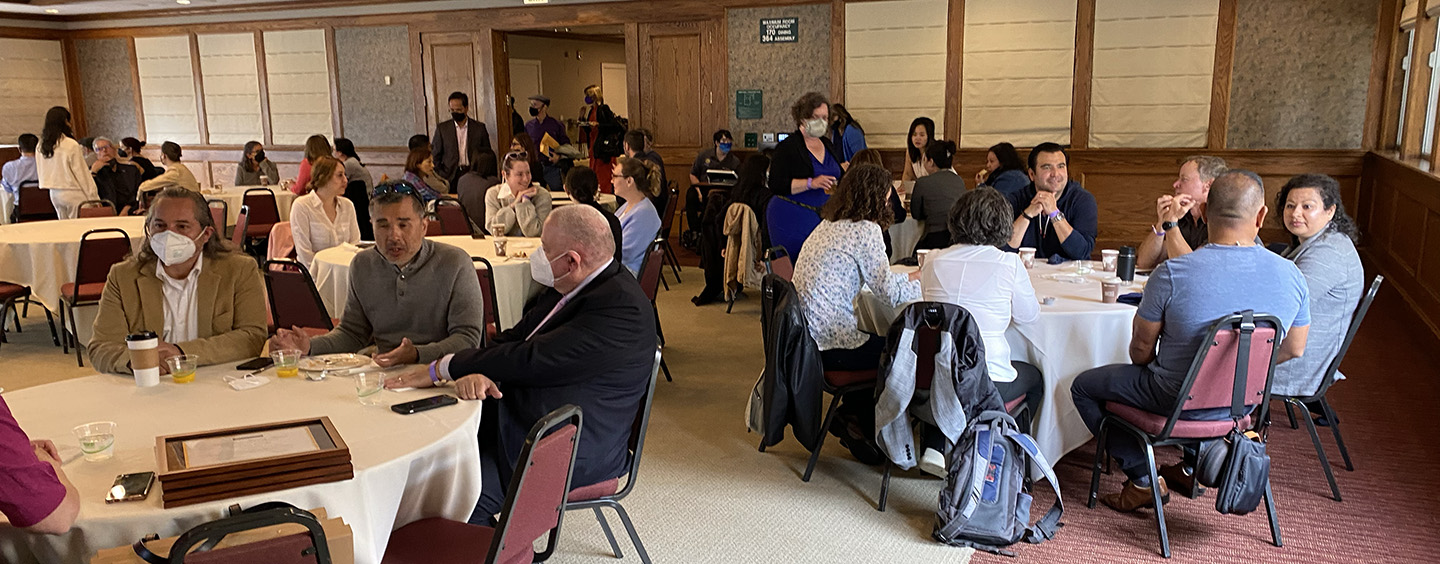
The College of Health & Social Sciences held its annual Fall Opening Meeting on August 18 in hybrid in-person and virtual format. In-person attendees enjoyed breakfast and mingling before the meeting at Seven Hills Conference Center. Dean Alvin Alvarez opened the event by celebrating the return of in-person connections. The dean introduced new faculty and staff, acknowledged newly tenured and promoted faculty and announced new leadership roles. Associate Dean John Elia presented the 2022 Faculty Excellence Awards. The event also included the presentation of the Lifetime Achievement Award for Excellence in Scholarship and Teaching to Professor Emerita Mickey Eliason (virtually).
The College of Health & Social Sciences welcomes four new faculty members this year:
Miguel Abad (Child & Adolescent Development)|
Angela Fillingim (Sociology & Sexuality Studies)
Cynthia Martinez (Counseling)
Soyhela Mohammadigorgi (Family, Interiors, Nutrition & Apparel)
Newly tenured faculty
Elif Balin (Counseling)
Amy Dorie (Family Interiors Nutrition & Apparel)
David Rebanal (Public Health)
Cesar Rodriguez (Criminal Justice Studies)
Kathy Shea (Nursing)
Sherria Taylor (Family Interiors Nutrition & Apparel)
Autumn Thoyre (Environmental Studies/PACE)
Stephanie Windle (Nursing)
Dilara Yarbrough (Criminal Justice Studies)
New full professors
Karl Kwan (Counseling)
Juliana van Olphen (Public Health)
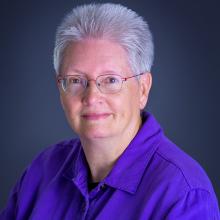
Professor Emerita Michele “Mickey” Eliason was honored with the College of Health & Social Sciences Lifetime Achievement Award for Excellence in Scholarship and Teaching. She received the award virtually at the College’s annual Fall Opening Meeting on August 18. Eliason served as the College’s first assistant dean of faculty development and scholarship from 2015 to 2022 and taught in the Department of Public Health at SF State for more than a decade.
Fit Plus is back, and so are you! The Fit Plus team is excited to have you back on campus and is ready to serve your fitness and wellness needs. Fit Plus is bringing some of the old activities and definitely bringing some new ones. See the Fit Plus webpage for the class schedule and how to register online.
The Feminist Health Justice Collective (FHJC) is a cross-disciplinary group of students and faculty members at SF State. Over the last two years, FHJC has been developing a resource to promote engagement with notions of health justice through a lens of intersectional feminism.
Inspired by syllabus projects that emerged in the wake of uprisings against violence, the Feminist Health Justice Collective decided to make a meta-syllabus of sorts: a database within which community members, academics, students and others could search by topic and generate their own syllabi or reading lists. Members of FHJC hope this resource will be relevant to your work and intended to serve community members/organizers, students and more. The collective is delighted to be in the last stages of this work and are getting ready to launch the resource soon.
FHJC asks for your help. In order for FHJC to know you better, please fill out this interest form introducing yourself and describing your interests in the FHJC.
One of the steps FHJC is taking on is to develop robust yet succinct descriptions of the Structural Frameworks around which the FHJC is centered. For example, see “Coloniality and Decolonization.” FHJC is interested in collaborating and developing this content for the Structural Frameworks in partnership with organizations and people whose work is focused in these areas. Contributors will have their name and/or organization appear in a byline for the description.
FHJC is also looking for database testers to experiment with the resource and let them know if there are things they could change or adjust. If you’re interested in signing up to support the collective, please visit the Feminist Health Justice Collective website.

Giving damaged or unwanted clothes a second life brings significant benefits to the planet and our community. Currently, there is low awareness and very few options to repair, recover or reuse damaged garments, so they often end up in local landfills — an estimated 4,500 pounds per hour in San Francisco. Goodwill sees many valuable, damaged items through community donations and wants better options to get the damaged garments back into the community for reuse to support their sustainability goals and create local jobs. A collaborative local pilot project, with participation by students in the Apparel Design & Merchandising (ADM) program at San Francisco State University, is designing solutions to this problem.
The Diverting Fashion from Landfill project called for fashion designers, fashion design students, innovators, manufacturers, menders, and tailors from across the state willing to take in unwanted clothing and textiles to repair or make new products. Funded by the San Francisco Department of the Environment (SFE) in partnership with the California Product Stewardship Council and Goodwill of the San Francisco Bay, the project aims to strengthen California’s sustainable efforts by increasing textile waste diversion and expanding opportunities for textile reuse, repair and renovation while encouraging greater awareness of the need for a circular textile economy.
Stop by LIB 121 on September 27 between 10 a.m. and noon to learn more about the project, see garments from the project, and meet community project collaborators. Come to be inspired to take action and understand the contributions you can make to support textile life extension.
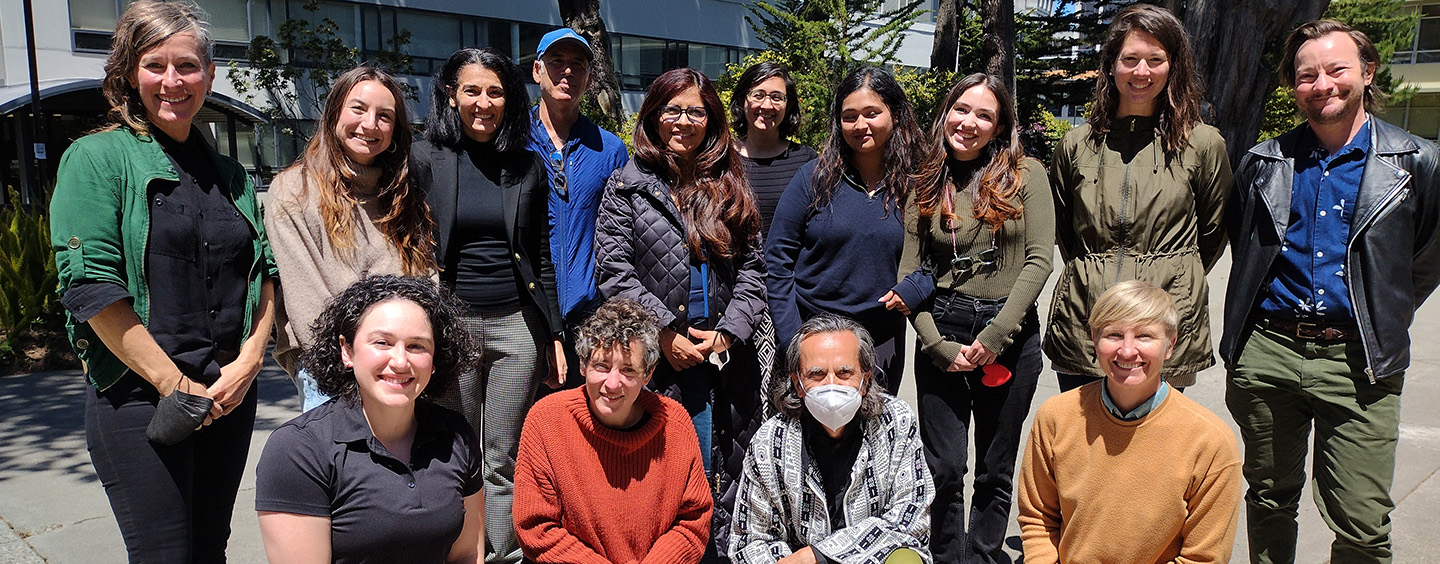
At the end of Spring ’22 semester, the Health Equity Institute Student Scholar poster session included posters by student scholars on work they had done with their faculty mentors on health-equity-related projects throughout the semester. The aim of the poster session was to help scholars learn to summarize their progress, discuss their work and refine their presentation skills.
Posters:
Estimating Joint Angles with the Google MoveNet Deep Learning Model
Helena Alvarez, Charmayne Mary Lee Hughes, Zhuwei Qin
Northern Californian Universities Describe Social-Isolation-Related Loneliness More Than Southern Californian Universities
Kelsey Brown, Anagha Kulkarni, Sepideh Modrek
Can Scholarship Hubs Promote Faculty Equity and Advancement?
Julia Cover, Laura Mamo
Measuring political participation in Asian-American neighborhoods: Selecting an optimal quantitative instrument for health research
Bonnie Dundee, R. David Rebanal
Temporal trends in children’s fruit and vegetable consumption: 2011-2012 vs 2014-2016
Maia Feinman-Welcher, Emma Sanchez-Vaznaugh, Maria Acosta
Review of Empirical Studies on Serious Mental Illness (SMI) Diagnoses Among Immigrants in the United States
Kohinoor Joshi, Supriya Misra
Stigma, Access, and System Barriers to Reproductive & Sexual Healthcare for San Francisco State University Students
Cynthia D. Rohrer, Sepideh Modrek
Professor of Kinesiology Maria Veri, Associate Professor of Family & Community Sciences Sherria Taylor, Associate Professor of Kinesiology Nicole Bolter, Professor Emerita of Public Health Mickey Eliason and Professor of Public Health Juliana van Olphen published “‘I Can’t Unsee What I’ve Seen:’ Doing Social Justice Pedagogy in the Research Methods Classroom” in Teaching in Higher Education.
This study examines the experiences of educators doing social justice pedagogy (SJP) via analyses of weekly reflections and interviews and revealed four themes related to the experience of doing SJP: Intentionality (becoming more self-aware); Vulnerability (sense of risk in trying this new approach); Holding Tension (contradictions between expectations, time constraints, old ways of teaching, and the new approach); and Meaningful Teaching Experience (satisfaction from increased creativity and witnessing impact of the intervention).
Veri, Taylor and Bolter presented on the findings of this study at the National Conference on Race & Ethnicity in Higher Education (NCORE) in June 2022. The presentation focused on critical-reflective approaches to addressing each of the themes as a means to support personal growth and development as a social justice educator, as well as strategies for modeling these approaches in the classroom.
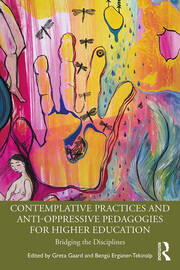
Jennifer Daubenmier, associate professor in Holistic Health Studies in the Department of Recreation, Parks & Tourism, co-authored an article and book chapter with colleagues from the Department of Public Health, including Associate Professor Lisa Moore, Lecturer Maiya Evans, and Professor Emerita Mickey Eliason, and Associate Professor Christopher “CJ” Koenig from the Department of Communications. It is titled, “Reflections on Developing a Campus-Wide Workshop Series on Contemplative Practice and Social Justice.”
The article was originally published in Journal of Contemplative Inquiry and republished as a book chapter in the newly released book,“Contemplative Practices and Anti-Oppressive Pedagogies For Higher Education: Bridging the Disciplines,” by Routledge, edited by Greta Gaard and Bengu Erguner-Tekinalp.
Research confirms that simply providing students with evidence and narratives of economic, social and environmental injustices proves insufficient in eliciting responses of empathy, solidarity and a desire to act for change. Daubenmier and colleagues describe how contemplative practices, such as meditation and yoga, can be integrated with social justice perspectives to foster community and institutional change. They share the development, execution and evaluation of a campus-wide series of 8 workshops held at SF State in 2017-2018 sponsored by the Office of the President, Academic Senate and Year of Conversation Initiative led by former Provost Jennifer Summit. The workshops promoted reflection and discussion on the relationship between contemplative practice and social justice in a diverse campus setting, including students, administrators, staff and faculty, in order to improve campus climate, enhance well-being of campus members and promote student success.
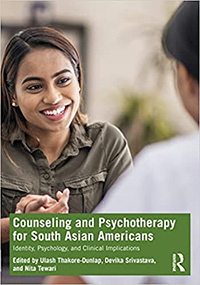
Ulash Dunlap, lecturer faculty in the Department of Counseling, has co-edited “Counseling and Psychotherapy for South Asian Americans: Identity, Psychology, and Clinical Implications,” which will be released by Routledge this October.
This essential text explores what it means to be a South Asian American living in the U.S. while seeking, navigating and receiving psychological, behavioral or counseling services. It delves into a range of issues including cultural identity, racism, colorism, immigration, gender, sexuality, parenting and caring for older adults.
Chapter authors provide research literature, clinical and cultural considerations for interviewing and treatment planning, case examples, questions for reflection, and suggested readings, as well as worksheets and handouts. The book also includes insights on the future of South Asian American mental health, social justice, advocacy, and public policy.
Integrating theory, research and application, this book serves as a clinical guide for therapists, instructors, professors and supervisors in school/university counseling centers working with South Asian American clients, as well as for counseling students.

Cristina Flores (M.A., Gerontology, ’03), PACE-Gerontology Program lecturer, is the principal and founder of Eldercare Advocacy Bay Area LLC. She has joined the governing board of the National Consumer Voice for Quality Long-Term Care. The Consumer Voice is the leading national voice representing consumers in issues related to long-term care, helping to ensure that consumers are empowered to advocate for themselves. It is a primary source of information and tools for consumers, families, caregivers, advocates and ombudsmen to help ensure quality care for the individual.
To carry out its mission, the Consumer Voice: 1) advocates for public policies that support quality care and quality of life responsive to consumers’ needs in all long-term care settings; 2) empowers and educates consumers and families with the knowledge and tools they need to advocate for themselves; 3) trains and supports individuals and groups that empower and advocate for consumers of long-term care and 4) promotes the critical role of direct-care workers and best practices in quality-care delivery.
Assistant Professor of Child & Adolescent Development Rachel Flynn recently published a manuscript titled, “Young children's social and independent behavior during play with a coding app: Digital game features matter in a 1:1 child to tablet setting,” in Computers & Education.
The research explored how five-year-olds played with computer coding apps on a tablet in a summer camp setting. Computer coding skills are part of computational thinking and a skill needed for many twenty-first-century careers. While young children are being taught these skills, very little is known about how they engage in the experience.
This descriptive research found that during digital game play, young children spend some of their time playing independently and some of their time collaborating and interacting with their peers, like non-digital play. In addition, the structure of the coding game mattered when it came to learning coding skills. An open-structured (i.e., sandbox) digital game required more sustained attention to result in learning, while a game with structured levels did not.
Professor of Child and Adolescent Development Soyeon Park co-authored the article, “A music-themed early critical literacy practice with young bilingual learners: A multiple case study,” published in Children & Society. The study explored how music-themed, critical media literacy instruction can be used as a facilitative medium to help young bilingual children deconstruct ideological discourse of the songs and gender representations in children's music videos.
Park also delivered a conference presentation at the annual meeting of the American Educational Research Association, which took place in April 2022. Her co-authored paper titled, “Unplugged robotics curriculum to support computational thinking: A qualitative case study with five-year-old Korean children,” investigated how unplugged activities with robots provide young children with opportunities to develop concepts related to computational thinking in naturalistic settings. The findings suggest that screen-free, unplugged robotics can help children learn the foundational concepts and skills they need for the increasingly digital and technological society.
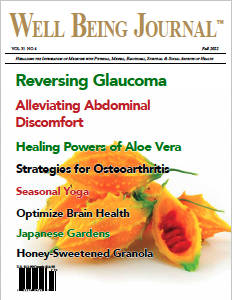
Professor Erik Peper of the Institute for Holistic Health Studies and Department of Recreation, Parks & Tourism published an article, “Strategies for Improving Abdominal Discomfort,” in the Fall 2022 issue of Well Being Journal. It was adapted and revised from an article by Peper and Professor Rick Harvey, “Nausea and GI discomfort: A biofeedback assessment model to create a rational for training,” which was published in the Spring 2022 issue of Biofeedback.

Professor and Coordinator of Gerontology Darlene Yee-Melichar was recently appointed to the Cal MediConnect (CMC) Advisory Committee of the San Mateo Health Commission. The Health Plan of San Mateo (HPSM) serves the most in need. HPSM programs serve one in five (20%) of all San Mateo County residents, representing diverse, low-income individuals and families, seniors, people with disabilities and children with complex medical conditions.
HPSM’s mission is to ensure that San Mateo County’s vulnerable and underserved residents have access to high-quality care, services and supports so they can live the healthiest lives possible. The CMC Advisory Committee’s role is to: 1) guide the strategic vision of HPSM’s CareAdvantage CMC program as it evolves; 2) review program policies and activities that impact members; 3) ensure adequate consumer protections are in place to protect members and 4) make recommendations to the San Mateo Health Commission on ways to improve delivery of care and services.
Current Events
MPA Informational Sessions
Thursday, September 1, 6-7 p.m.; Tuesday, September 13, 6-7 p.m.; Tuesday, September 27, 12-1 p.m.; Wednesday, October 5, 12-1 p.m.; Wednesday, October 12, 6-7 p.m.
Gerontology Informational Sessions
Monday, September 19, 6-7 p.m.; Wednesday, September 28, 12-1 p.m.; Monday, October 19, 6-7 p.m.
Exhibition: Diverting Fashion from Landfill
Tuesday, September 22, 10 a.m.-12 p.m. LIB 121
Jimmy Bagley
Associate Professor of Kinesiology Jimmy Bagley was recently quoted in a Women’s Health Magazine article titled, “Fitness Game Time: Virtual Reality (VR) Fitness is Making Workouts Fun for Movers of All Levels” (July/August 2022, U.S. print edition). Bagley and other expert discuss current trends and the potential future of VR exercise and fitness.
James Dudley
Lecturer of Criminal Justice Studies James Dudley wrote an article about a plan to speed up the recruitment process for police officers. PoliceOne 8/15/22
Jen Reck
A study about homeless gay and transgender youth of color in San Francisco by Associate Professor of Sociology Jen Reck was cited in an article about how business owners in the Castro are responding to unhoused individuals in the neighborhood. SF Gate 8/29/22
Carolina Wilson
Nursing student Carolina Wilson discussed participating in a summer nursing internship program in a story about the nursing shortage. KTVU 8/6/22
Tom Berry
(M.A., Gerontology, ’05)
Tom Berry (M.A., Gerontology, ’05) was promoted to Sunrise Senior Living’s national director of business development. Berry has worked for nearly 20 years in senior care in the San Francisco Bay Area. He will lead the Managers of Business Development team, using his creative and tactical strength to grow professional relationships nationally. These concentrated efforts will reinforce and support the organization’s strategic focus areas and plans for future growth. Berry started working for Sunrise Senior Living in 2004 and has served in regional operations and sales roles supporting Bay Area communities and the IFS portfolio for the past seven years. Previously, he served as executive director at two Sunrise communities, The Carlisle and Sunrise of Walnut Creek. He is currently the president of SF State's Gerontology Advisory Council.
Steven Machek
(M.S., Kinesiology, ’18)
Steven Machek (M.S., Kinesiology, ’18) was recently named assistant professor (tenure-track) at CSU Monterey Bay. After his time at SF State, Machek earned a Ph.D. at Baylor University and continues to collaborate with the Department of Kinesiology at SF State.
Trenton Stewart
(M.S., Kinesiology, ’20)
Trenton Stewart (M.S., Kinesiology, ’20) was lead-author on a recent peer-reviewed article published in Frontiers in Rehabilitation Sciences titled, “Actual vs. Perceived Exertion during Active Virtual Reality Game Exercise.” This original research study was the culmination of his master’s thesis work and is featured in a special Research Topic edition (Virtual Reality Therapy and Immersive Education) It includes student co-authors Kirsten Villaneuva, Amanda Hahn, Julissa Ortiz-Delatorre, Chandler Wolf and Randy Nguyen. Faculty co-authors inlcude Associate Professor Nicole Bolter, Professor Emerita Marialice Kern and Associate Professor Jimmy Bagley.
Submit an item
The deadline to submit items for the September 13, 2022 issue of CHSS Connection is September 6. Send submissions to mbroder@sfsu.edu.